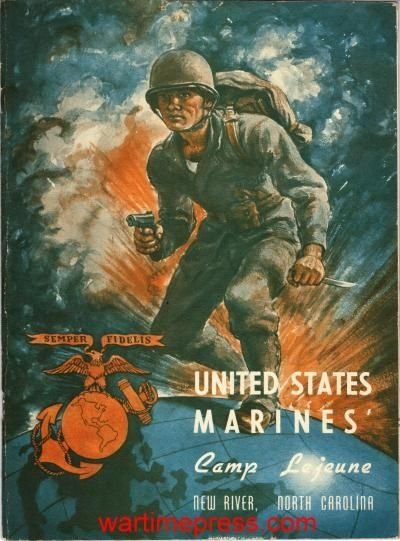The Magnificent Amphibians
/Recently I was looking through an old binder of mine, trying to find some papers and I discovered the whimsical piece below clipped into an old letter from 1943 that I acquired a number of years ago. The letter is from a Private Howard Pelkey USMC, written home to his wife.
At first I wasn’t sure if Pelkey was the author, or if he’d just copied it down for his wife’s amusement. Turns out the piece “The Magnificent Amphibians” was written by the fabulous author and soldier, Marion Hargrove, and published in a 1943 edition of the Quantico Sentry.
Pelkey was actually quite a good writer himself, and during his time in the Marine Corps shared an extensive correspondence with his wife, often times decorating the envelopes with hilarious cartoons. At some point I’ll share some on here For now, I’ve transcribed the below for your reading pleasure. Prepare yourself for a few laughs.
The Magnificent Amphibians
By Cpl. Marion Hargrove US Army
The United States Marine is a military phenomenon who looks like a soldier, talks like a sailor, fights like a wildcat, and thinks like a princess of the royal blood. Always a modest fellow, the
Marine describes himself as a member of the best fighting outfit in the world.
The United States Marine, as any United States Marine will tell you with or without provocation, is the best looking, toughest, most intelligent, most polished and most valuable member of the armed forces. When he heard that one-third of the nation is poorly housed, poorly clothed and poorly educated, he knows which third it is. It is the Army and the Navy.
The sight of a full-dress Marine is a sight to dazzle the eyes of all who behold it. In any shortage of electrical power, you could suspend him from a lamp-post and he would provide enough light for all his duller looking compeers to read a newspaper at a distance of four blocks. This splendid spectacle – this symphony of blues and white, of reds and golds – is the Marine with the splendor of his personal beauty, his proud physique and his pretty phiz, to lend magnificence to the American scene.
The Marine is extremely proud that he is an amphibious creature. Get one of them to take off his shoes and what do you find? Web feet.
The Marine thinks of his barracks as a ship and he speaks of it in nautical terms. A wall is a bulkhead; a floor is a deck, to be holystoned rather than scrubbed. A latrine is a head. The Marine never goes upstairs; he goes up topside. When he gets up topside he isn’t upstairs on the second floor, but the second deck. And he didn’t get there by the stairs, he went up the ladder.
When a Marine is indoors or has no hat on, he doesn’t salute his officers. When he is outside and salutes, his officer smiles very pleasantly and says, “good morning” or some such thing as that. This is because the officer has a deep respect for the Marine. “There is a member of the most efficient fighting force in the world,” he says.
All is not peaches and cream in the life of a Marine though. He gets less liberty than a soldier and a three day pass doesn’t mean as much to him, since half that time must be spent in making himself as pretty as possible. When he leaves his barracks, he must pass the inspection of two full-length mirrors just inside the front door.
The remainder of his leave must be used to best advantage in informing his family, his girls, his old boss, and any other unprotected civilian he might capture just what a great and wonderful thing the United State Marine COrps is and how lucky the civilian is to know someone who is actually in it.
To make his spiel more effective, a good Marine will always have about him a fresh clipping headed something like, “Army Captain Goes Over HIll to Join Marine Corps” and at least one pad of notes to prompt himself on just exactly how the Marine Corps single-handedly won every battle in every war the U.S. has fought.
The Marine does not overlook the value of the Army and the Navy. He knows that they were organized and maintained to show, by contrast, the greatness, the wisdom, the courage and the beauty of the United States Marines.
This piece by author, Marion Hargrove, on the Marines can be found in Quantico Marine Sentry, Volume 9, Number 6, 16 July 1943
When he died at the age of 83, the LA Times described him as, “Marion Hargrove, the Army draftee from North Carolina who turned his misadventures in basic training into the humorous World War II bestseller “See Here, Private Hargrove… Hargrove, [was] a television and film writer whose credits include “Maverick” and “The Waltons” as well as the screen adaptation of Meredith Willson’s “The Music Man…. Inducted into the Army on July 18, 1941, Hargrove underwent basic training at Ft. Bragg, N.C. He wrote about his experiences for the Charlotte News in his column, In the Army Now -- gently humorous tales of sleeping through reveille, mistakenly saluting noncommissioned officers, learning his left foot from his right while marching and landing KP duty instead of a weekend pass. As he later put it, Pvt. Hargrove represented the type of soldier raw recruits should not emulate.”
Operation Meatball
Honoring Veterans & Connecting Them With the Youth of Today











